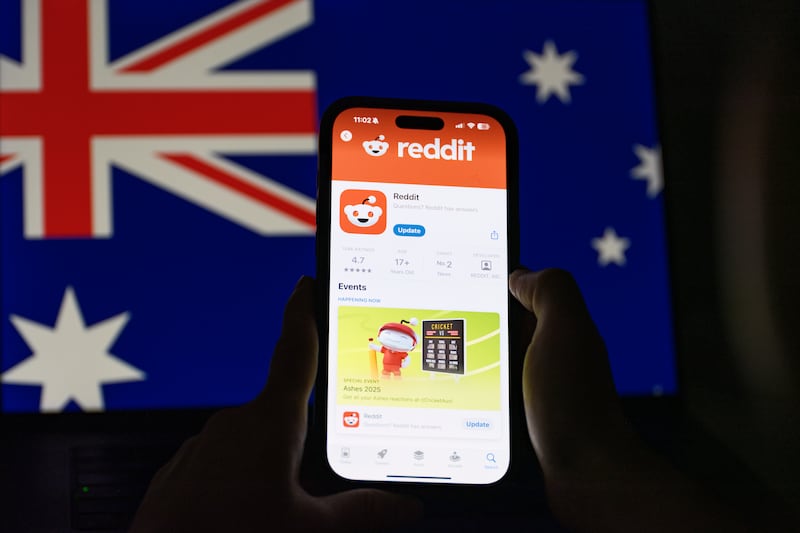When Sarah Friar announced she was stepping back as chief executive of neighbourhood tech platform Nextdoor, she had a plan.
“I felt I had done all I could – inject big growth into the system. I’d taken Nextdoor public, I made sure the balance sheet was really robust, I’d done a lot of work on the product and kind of rebuilt the whole site from scratch,” she says. “I wasn’t feeling though that my growth trajectory was still like this. I felt like I was plateauing a little. And frankly, I was at a stage of life where, ironically, I thought maybe I wanted to retire and take a break.”
It didn’t quite work out that way. Within a few weeks, OpenAI came calling via Larry Summers, tapping her to be the company’s next chief financial officer. Friar was intrigued.
“All the delusions I had of this beautiful life I was going to lead? Bye. I’ll go back to working really hard,” she says. “But how could I say no? It was just an incredible moment for technology, and that’s certainly lived up to that promise. I feel like I’ve gotten a front-row seat to incredible outcomes.”
READ MORE
That was in June 2024. Almost a year later, Friar is at the Dublin Tech Summit, discussing everything from AI safety to the future of the sector. The general consensus from those who have heard her speak is that she is the adult in the room, a voice of reason in an industry that has given people cause for concern.
“I felt I had a skill set that Open AI needed. It definitely was going to need to raise money, needed to be kind of respected in the markets with investors. It hadn’t really had a business plan. Finance without strategy is really directionless, but strategy with no finance is totally toothless – no one can get anything done.
“I felt like I could bring that,” she says. “Also it was a company that was growing at speed, and then culture is really important. So I felt like I could be that leader that isn’t just going to stay in my lane.”
OpenAI lit a fire under the generative AI industry when it surprised the tech world with the public launch of ChatGPT. There were teething problems, particularly around hallucinations, where the technology would make up facts and supply inaccurate information to queries.
But Friar says many of those early issues have been resolved, or at least vastly improved. The introduction of reasoning models has also made the technology smarter, and ChatGPT now has memory so it can learn from its interactions with people.
Friar is a frequent user of AI herself, a habit that predates her time at OpenAI.
“I was definitely one of those people who was on the wait list the minute [ChatGPT] hit Silicon Valley, and everybody wanted it. First, all I did was create rhymes. For Nextdoor, I did my holiday speech to the company in rhyme, which I thought was so clever and I’m mortified,” she says. “That’s versus moving to real outcomes today: personalised education in school, drug discovery.”
She points to Moderna, which uses the technology for personalised doses for vaccines, college students using ChatGPT as an educational aid to learn about complex problems.
Finance without strategy is really directionless, but strategy with no finance is totally toothless – no one can get anything done
— Sarah Friar
It also functions well as a wine sommelier, Friar says, particularly with the technology’s ability to use your phone’s camera. “I take a photograph of the label, and you can say, tell me about this wine. What should it pair with? How should it taste like? Is it good to drink now?”
Since Friar joined, OpenAI has announced two funding rounds: the $6.6 billion (€5.8 billion) Series E funding round in October 2024, and the blockbuster $40 billion round in March, the largest private tech funding round to date. In total, the company has raised $57.9 billion across 11 funding rounds, with backers that include Microsoft and Softbank.
AI is widely considered a bit of a money pit, one that the companies involved are hoping will pay off. Innovation and ambition are expensive, not to mention the ongoing cost of serving up answers to queries and deeper research requests.
These days, ChatGPT offers a range of subscriptions for users who want to get more out of the system – unlimited use, building their own custom GPTs, enterprise-level access.
But the majority of OpenAI’s users – 95 per cent, Friar says – are still on the free plan. OpenAI has no plans to try to force these users to pay. Instead, it will use the more expensive subscriptions to support that access. ChatGPT’s plans range from $20 to $200 a month.
“We needed to build a business model that continues to support a lot of free use,” she explains. “For all the rolling of eyes on the Twitterverse, for people who want to do a lot of coding, a lot of deep research, things that take a lot of tokens, they are delighted to kind of pay that amount of money.
“If you take my husband, he’s an investor. He effectively thinks of Deep Research as like his analyst, and he’s like $200 a month. I would not even get an analyst to work for me for a month for that. And so I think if you see the value, you get there.”
Although OpenAI does not specify revenue figures for its products individually, Friar says the $200 a month ChatGPT Pro hit one milestone sooner than the rest - reaching $100 million in annual recurring revenue in a short time.
The bulk of OpenAI’s users are outside the US, necessitating its overseas expansion. This is where Ireland has benefited; OpenAI has made Ireland its European headquarters, a point of pride for Friar, who is originally from Co Tyrone.
There are plans to grow the Irish office, she says, as OpenAI seeks to expands its European presence.
“We do have a very vibrant Dublin office that is starting to grow and it will get big over time because it can be an office ... where we can put research and apply it potentially over time,” she says. “It’s a really good place for what we call FDEs – forward deployed engineers – who tend to work alongside a customer to help bring their wildest AI dreams to some sort of fruition. So we are definitely investing in Dublin.”
However, the EU does not have the greatest reputation among companies that are trying to move fast and create a new industry, with regulations intended to put guardrails on technologies such as AI seen as a hindrance to the sector. Friar says that while OpenAI welcomes regulation, it is possible to overdo things.
“Particularly in a young technology where we’re still all somewhat figuring out and it’s moving at the speed of light,” she says, “I think you can get into a way over-regulated environment and I think that’s the place where the EU does need to be careful and mindful.”
As the technology has advanced, so have concerns about its use and the potential for bad actors to weaponise AI.
“Am I worried about deep fakes? Yes; that’s a malicious actor moment. But also, if someone’s going to stop it, I think it’s technology on the other side. I think this goes back to being responsible with what we roll out,” says Friar. “We don’t say that we’ve got it all, we know everything, because that would not be very humble and also not very true. But this is where we have to go – work with regulators, work with governments, work with research institutes.
“And I think if you get enough of the right, the good people on one side, you’ll continue to keep the technology safe but you’re not going to be able to keep it in a box. It’s just not a tenable outcome.”
OpenAI has made some big moves recently. The company has signed up Jony Ive, the former Apple designer, to create a device that will bring AI to people without relying on a smartphone. The device itself remains a mystery for now, but Friar seems enthusiastic about the partnership.
“Every tech era has had the thing, the substrate. The internet age, I don’t know if it happens without the PC,” she says. “When you got to the mobile phone era, the touch screen is what made the phone.
“In the world of AI, we are still, like, these devices force us to talk with our thumbs. How do we create a much more holistic view of a substrate to work on top of it? I don’t think we’ve had that springboard moment where we’re like, oh, there’s all of this intelligence, now what could really happen?”
Ive, she says, has done really well in the last two big generation shifts in the tech industry. But it isn’t just about him; there is a whole team behind his IO company with the expertise to take the ideas into reality.
[ Can Jony Ive replicate the Apple magic at OpenAI?Opens in new window ]
The stakes are high on this one. Not only has the company spent $6.5 billion on buying IO, but it is also trying to succeed where others – most notably the Humane AI Pin – have crashed and burned. Sold off for parts to HP, Humane now lives on as a cautionary tale. But OpenAI seems confident that the partnership with Ive will pay off.
“What we’ve bought with IO is that holistic picture,” Friar says. “Maybe we’re not the folks who will win on the device, but we’ve certainly injected a lot of excitement into the ecosystem right now, and I think that’s only good for, ultimately, where we’re trying to go in the age of intelligence if the whole ecosystem is vibrant.”



















